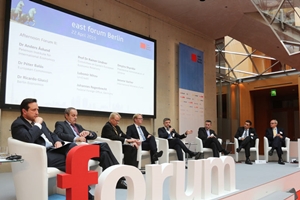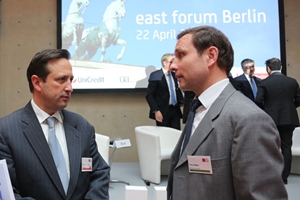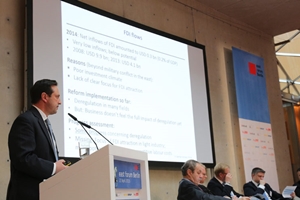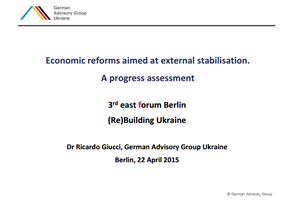Presentation at the 3rd east forum Berlin“Economic reforms aimed at external stabilization. A progress assessment”For the third year in succession, east forum Berlin was devoted to the opportunities and challenges for a common economic space from Lisbon to Vladivostok. 350 opinion leaders from the political and business worlds of 25 countries discussed a future design of political and economic European integration. Dr. Ricardo Giucci, head of the German Advisory Group Ukraine, reported on the progress of reforms aiming at macroeconomic stabilization within the panel discussion “(Re)Building Ukraine”. The Resident Representative in Ukraine, Jerome Vacher, gave an overview on the IMF’s program for Ukraine in his introduction. The panelists then gave short introductory talks according to their topics ranging from international politics to economic analysis.
Giucci in his talk pointed to the urgency of macroeconomic stabilization, which however cannot be restored by monetary and fiscal policy alone. In fact, a multitude of reforms to stimulate growth on the microeconomic level is necessary, since “macro-stabilization and reforms go hand in hand”. Reasonable reforms should approach the five biggest possible (de)stabilizing factors: Exports and imports, internal capital flight, foreign direct investment (FDI) and official loans. Internal capital flight in 2014 amounted to just under 3 bn US-Dollar and can be attributed mainly to the lack of confidence in the banking sector. Here, the already good reform progress must be emphasized that was achieved to a big extent despite considerable opposition. An example is the new legislation introducing unlimited liability of bank owners and managers on losses arising from related-party loans. By raising heating tariffs for the population, a crucial first step has been undertaken to reform energy and gas imports. Now a sustainable decrease of energy and gas consumption must be targeted by investments in order to further diminish energy’s share in imports, Giucci explained. Concerning FDI attraction, a clear focus on light industry is still missing. This sector is potentially very attractive for investors due to the very competitive labor costs. In addition to that, investment climate can be sustainably improved by further deregulation. A lot remains to be done in export promotion despite a considerable depreciation of the Hryvnia. One the one hand, an export re-orientation is required due to the massive contraction of the Eurasian Economic Union’s market for Ukrainian products. On the other hand quality standards remain to be improved. This process was unnecessarily delayed by shifting the implementation of the DCFTA to 2016, Giucci stated. Still outstanding are reforms concerning official loans and project finance. “We observe minimal progress in this area, despite the fact that these are rather simple reforms with high expected stabilizing impact”, Giucci said. The net official loans were mostly used for budget and balance of payments support. Project finance in the public sector showed rather low inflows. “That is because project finance in Ukraine is a very complicated, bureaucratic procedure”, he explained, “Discussions to simplify that procedure already take place, but there is little progress so far and a lot remains to be done.” The east forum is an event jointly hosted by the Committee on Eastern European Economic Relations and the UniCredit Bank.
Presentation „Economic reforms aimed at external stabilisation. A progress assessment.”
Website: 3rd east forum Berlin Pictures: Marc Darchinger, www.darchinger.com |



